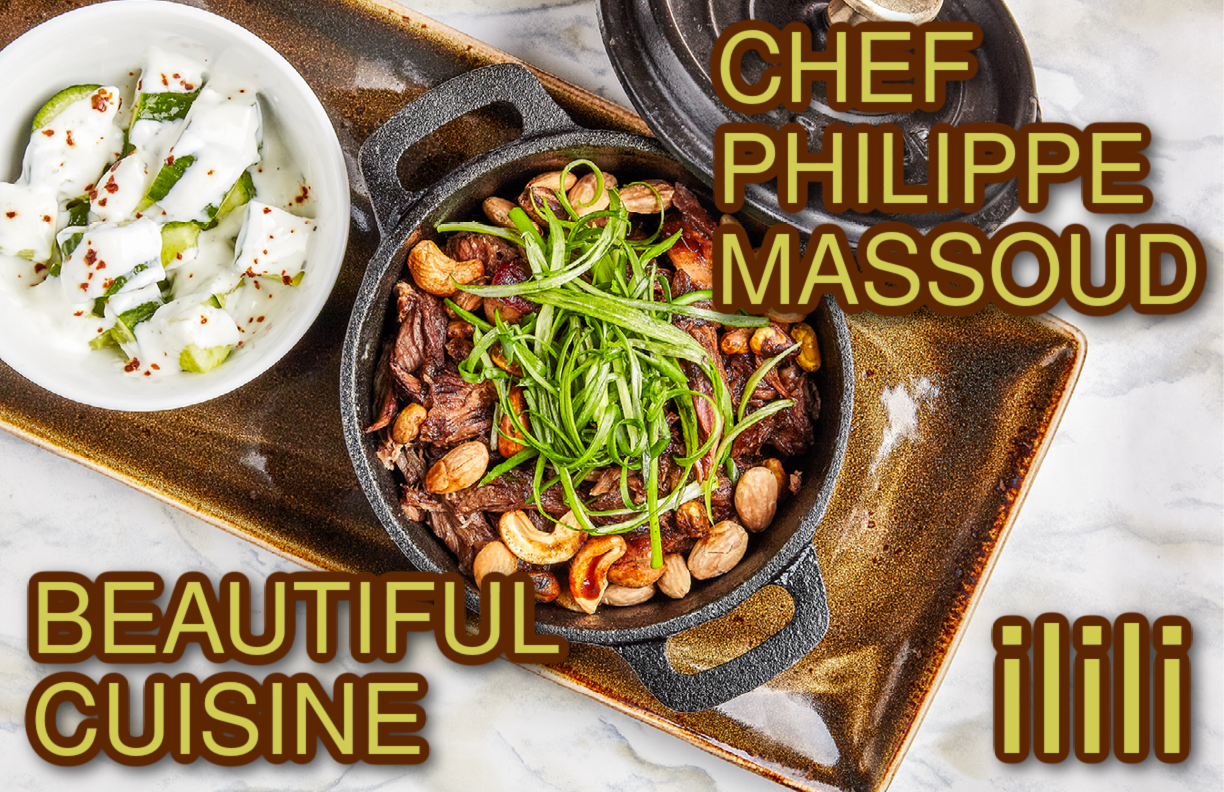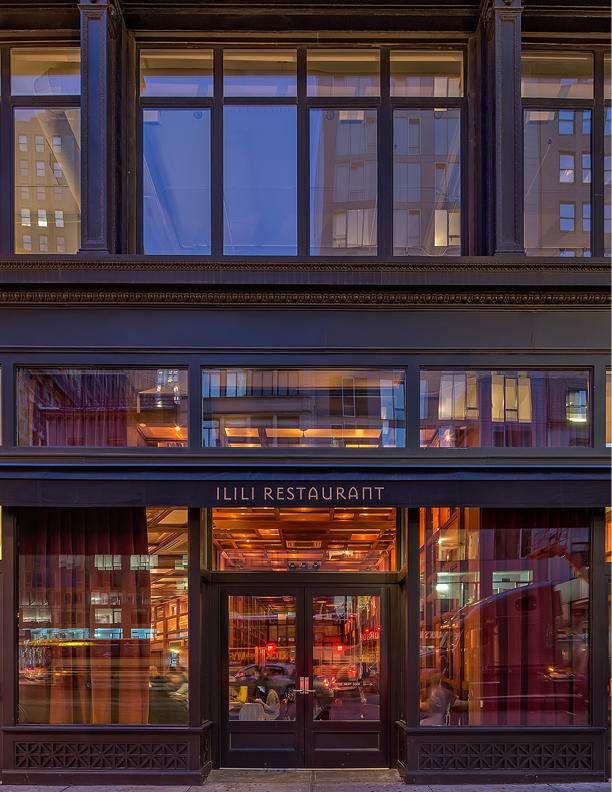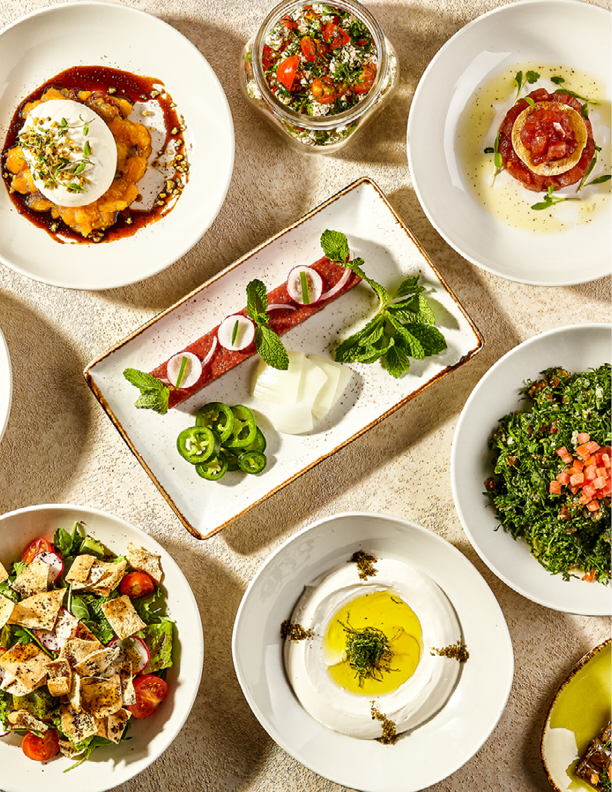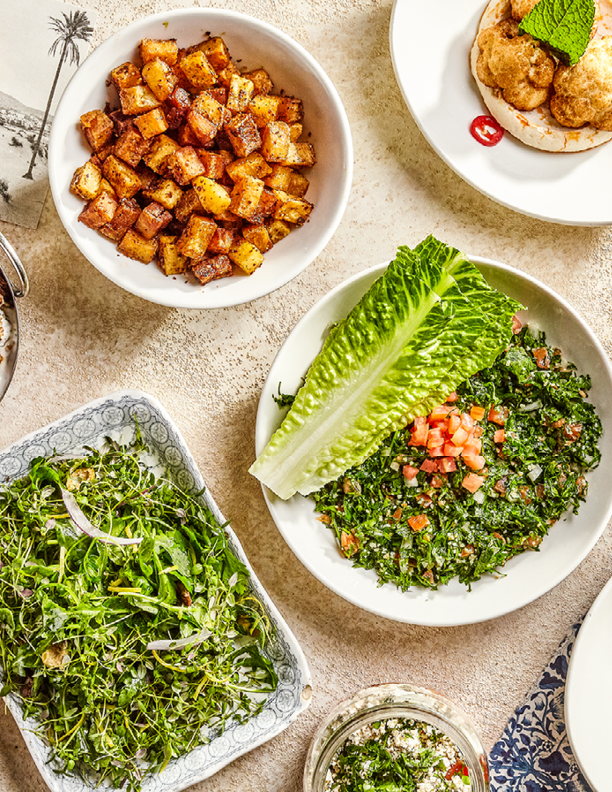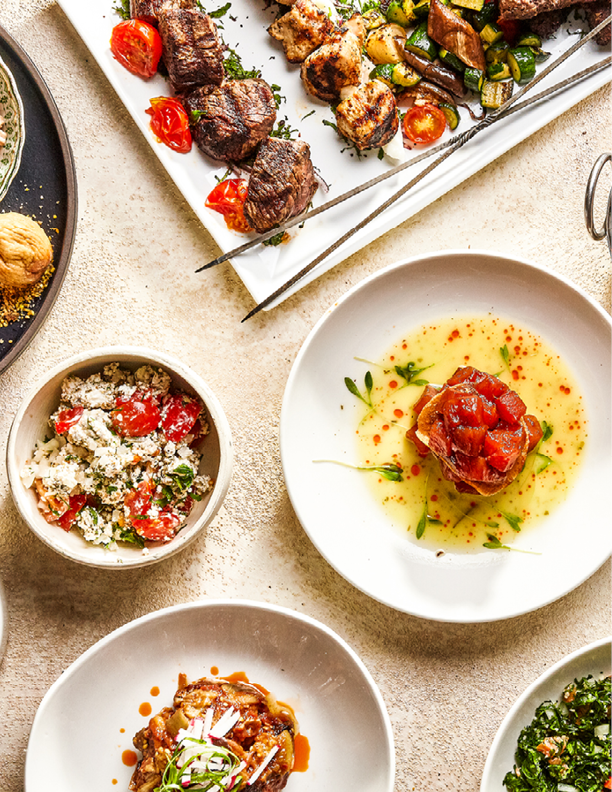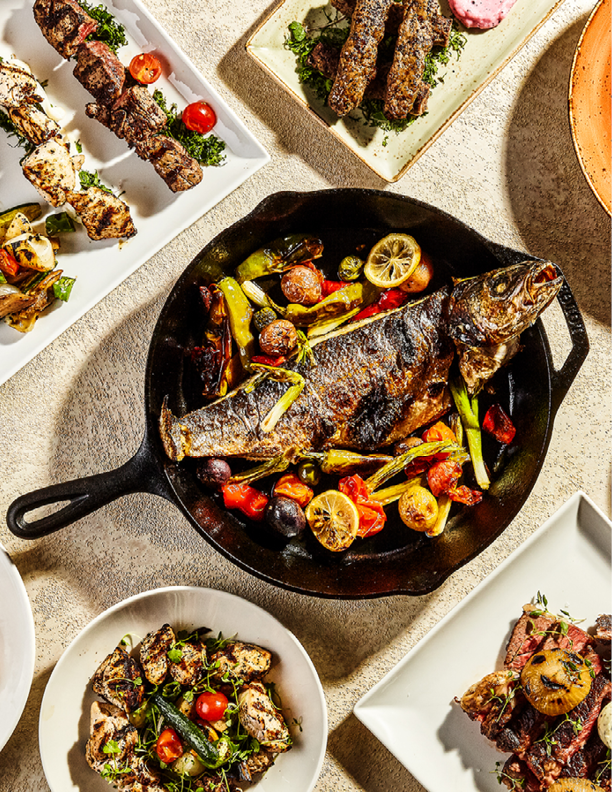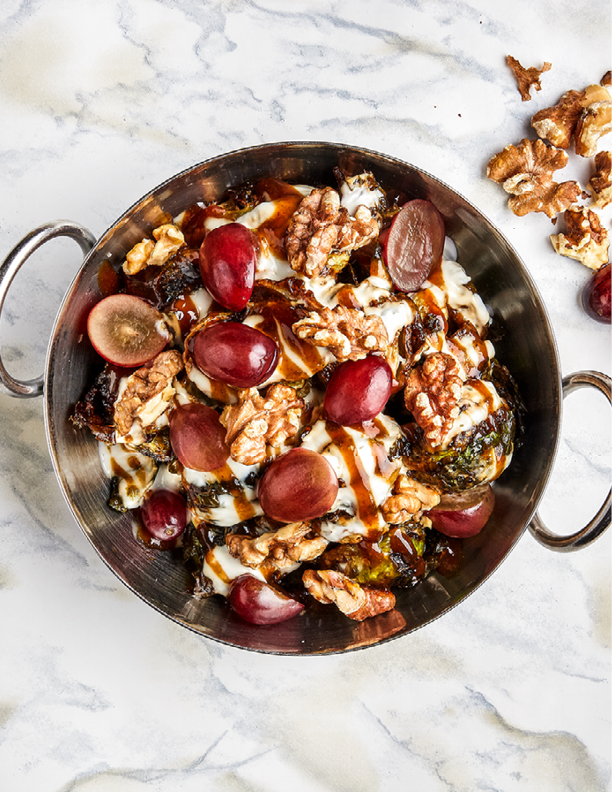When you're enjoying a meal, each bite creates a memory of the sights, sounds, and occasion that is taking place. But in other cases, each bite creates a bridge to culinary and cultural history as a means to ensure that a heritage and dedication to flavors lives on. This month, we sat down with Chef/Owner Philippe Massoud of one of our favorite restaurants, ilili here in NY. We have made our own memories at this restaurant and enjoyed a number of meals here as we have our favorites when we dine here.
The name ilili translates to "tell me," and in each bite, Chef Philippe is telling and building an intricate food storytelling canvas that connects us his to his people from centuries ago. In our discussion with him, he took us on a vivid journey of how growing up in a culinary family in Lebanon that navigated war, while also offering hospitality to its guests, led him on a quest to maintain a connection to his culture by recreating dishes that we are now able to enjoy here in NY as well as in it's DC location. We talk about his passion for hospitality, commitment to food, the flavors of Lebanon, bringing authenticity of the cuisine to those who may have been previously unfamiliar, and the impact of his legacy.
ATHLEISURE MAG: When did you fall in love with food?
CHEF PHILIPPE MASSOUD: I fell into food before I fell in love with it. Being in a family who has been in the business since back to the 1800s, both my paternal grandfather and paternal grandmother were in their respective families, into food. They started, my grandfather used to walk from his village to go work as a cook in the home of the rich and the famous as a prep cook. Then subsequently, he traveled with his brother to Alexandria, Egypt which back then was the hub, the capital of the aristocracy, nobility, and the pizzazz. He went and worked in palaces and hotels or what have you. They they came back to Lebanon and they opened a restaurant in downtown Beirut in the 1800s. Him and his 3 brothers actually brought in Austrian pastry chefs to teach the Lebanese how to do pastries, ice creams and chocolates. In that restaurant, you had a little chocolate stand, an ice cream stand, and a pastry stand, and you had the restaurant which also did a lot of catering.
So long story short, fast forward to when I was born, I was born into that DNA. My father used to cook for us every Sunday and we used to have these glorious meals and food was always a topic of conversation. When the war broke out in Lebanon, I ended up becoming a refugee in eventually what became our family business which was a hotel. The family grew from a restaurant to my grandmother and grandfather doing a Bed & Breakfast in the mountains of Lebanon. My grandmother sewed all of the bedsheets and the curtains. My grandfather ran it and eventually, they sold that, bought a piece of land and had the courage to build one of the first beach resorts in Lebanon which was called the Coral Beach. So when the war broke out, we were coming down from the mountains and we said, “ok, we can’t go home. It’s not safe. Let’s go to the hotel and then we’ll go home as soon as the quarrels stop.” We never went home. We lost our home in Beirut and we lost our home in the mountains. They were robbed, pillaged, and burned because we were from one religion and our homes were in an area of another religion. All religions behave really badly unfortunately.
So living in the hotel because we were confined to the hotel on many occasions, and because the hotel also became the refuge of many refugees, the hotel became my little park. My alternate world, my world of stability and to escape from the bombs, the bullets, the death, and the destruction. So I used to walk into the kitchen and to the patisserie and to steal petit fours and eat them. I would enjoy the tempered chocolate that was resting on the top of the baking oven of the patisserie and just eat spoonful’s of sugar and chocolate and grand patisserie and what have you. I did not know that this would be my calling at the time, but I think that that’s where my formation started. Because I was exposed to that and I loved eating, I loved tasting, and subsequently as a little kid, my first experience really – we had a French restaurant in the hotel that was a Michelin level restaurant where we had the gueridon and with it the steak au poivre table side with the sommelier table side – Baba au Rhum and Crepe Suzette. We had all of the French classics of the time. So, watching the maître d working the pan and sautéing the filet and then putting the cognac on and all of that, it was mesmerizing to me.
So, I asked one of the maître d’s to teach me to do that as a young boy. I don’t know I think I was 6 or 7 or maybe even 5. I dabbled with it right? Subsequently, during the war, but things had subsided a bit as we had gotten used to living with the war, we moved to an apartment and all of a sudden, I find myself in this apartment going food shopping with my mother in the super market and buying ready made cakes from Duncan Hines or whatever it was called back then. I’m appalled by how they taste because I was eating all of this freshly baked stuff that was freshly made and all of that. I wasn’t going to have any of it. I started calling the chef at the hotel and I said, “listen, I want to do this. How do I do it? Can you share a recipe with me?” So as a young 8 year old, I started baking cakes, crepes, figuring out how to make pastries, sweet cream, and understanding why the pastry cream wasn’t rising. In essence, it was because I had lost the access to all of this amazing food that I needed to have that food; therefore, was compelled to learn it and to figure it out at a very young age.
Then when my parents would be hosting guests, we would do catering from the hotel and I would spend my time in the kitchen with the chefs helping them plate because I loved all of this multi-tasking, 4 different pots on the stove, the hustle and bustle and all of that. I watched and I developed a palette and a taste at a very young age. Subsequently, when I became a teenager, I would be the one that would cook for my friends. When we went out, if we were out late after hours, I was the guy that would bring out the pan and would start cooking and setting up at 4 o’clock in the morning to drown all of your alcohol so to speak! That went on and at the time, my father didn’t want me to do any of that because he wanted me to get a degree like all parents want – to be a lawyer, a doctor, or become a neurosurgeon. This industry is back breaking and is difficult.
Subsequently, when I came to the US and I experienced Lebanese food as it was being served and reproduced, I was having none of it. It was so far from the foods, it was so far from the authenticity and I could not for the life of me understand why it wasn’t being reproduced correctly. I knew how to do it and I would even quarrel with my aunt whom I was living with at the time. I came as a tourist and then my parents called me and I was 14 years old and they told me that I could not come back home and that I needed to stay in the US because it was no longer safe in Lebanon. Therefore, I became a refugee. I was accepted in the public school system thankfully and I am extremely grateful for this country giving me the opportunity and therefore, I missed everything that made me who I was which was the food. I started cooking again and my aunt would cook and I would say, “this doesn’t taste like the Coral Beach.” She would then ask me what I would want to do and then I would say that we should do this or do that. She would say that it would take too much time and then she’d say, “if you don’t like the food, don’t eat it.” She was fed up with me because I was complaining all of the time!
All along, I took notes in a little recipe book that I kept – just basic stuff and all of that. I went to Cornell University and I studied for a degree in Hotel and Restaurant and Resort Management. Part of that program is that you have to do kitchen training, you have to understand food production and what have you. I discovered the recipe card and when I saw the recipe card, I thought, “oh my God I never thought about food this way.” I realized that at the end of the day, a recipe in a way, is a mathematical equation. It’s a balanced equation between the flavors, the textures, and the technique. I love that! So I started putting my little scratchy notes with my chicken shit writing into the recipe card and I started experimenting because I missed the food. There was a restaurant on campus that was kind of a fast casual at the time serving the food, but the food was really not there. Every morning before class, I would stop by and quarrel with the chef and beg him and say, “listen, we can do this better. Why don’t we do it?” Unfortunately, with a lot of immigrant cuisines, because our industry is so back breaking, they’re ok bending the flavor profile, bending the textural profile because they are doing the best that they can. The audience does not know the difference between the authenticity and not. This is where for me, it was an absolute no no because why are we teaching people how to eat this food incorrectly? Why are we modifying it? It’s really good, it’s really delicious and we should be serving it unadulterated in its authentic form and in the right way.
So while I was in college, my father got killed and the hotel that I thought that I would eventually go to work in got sold because we had to sell it under the gun. We were pretty much kicked out of the region that we were living in because we were Christians at the time. The same thing happened to Muslims on the other side. It’s not like Christians were behaving better than the Muslims and vice versa. Everybody was misbehaving and being evil. I found myself orphaned of a destiny that I thought was already written for me. I realized that I didn’t see myself working as a front desk manager in a hotel. I don’t see myself doing housekeeping. I really see myself working with this cuisine and correcting its path. I decided that I was going to jump into the food and jumping on the bandwagon, enhancing and elevating Lebanese cuisine. So I started really developing a menu and then all of the different ideas that I had. I started developing recipes for them based on my memory and what it was that I ate as a child. Don’t get me wrong, I failed and failed and failed. I burned and it tasted like crap and it gave me a stomach ache and it took me a long time. But I am a Capricorn and I have horns and I don’t give up easily and there is nothing such as failure in my vocabulary or my drive. I subsequently decided to prove to myself that I could cook the food and that I could really do it right.
While I was in college, I did 2 things. I did co-ops, my practical training that I had to do every semester. I did it in hotels in Spain. I worked in restaurants in Spain in the kitchens and worked in the pastry department, the savory department, prep departments, and it was back breaking. Back then, we didn’t have clogs and Birkenstocks and whatever. I was working in moccasins like all of the Spaniards were.
AM: Oh wow!
CHEF PM: It was not fun! But I loved it. I was working in very busy hotels - 250 rooms. So I understood and it was natural to me. It’s not like I was out of my element because unbeknownst to me, it created a lightbulb moment! You know when Malcom Gladwell talked about the 10,000 hours of training that you get to really become an expert in your area or what have you. I got a lot more than 10,000 because my entire life was in that.
I went to Lebanon and there was a famous – one of the top Lebanese restaurants at the time - called Bourj Al Hamam whose owners had worked with my grandfather in the past. You have to realize that a lot of the chefs in Lebanon and a lot of the pâtissiers when you’re talking about the 1800s and 1900s, had either worked, collaborated, or trained or did their internships with a business in which my grandfather had been involved because it was a very small country. My grandfather was like the Danny Meyer (Blue Smoke, Manhatta, Gramercy Tavern) of his times or the Stephen Starr (The Dandelion, Barclay Prime, Parc) of his time in Lebanon. They opened up the doors for me like it was my own restaurant.
I had my chefs pants and white coat from college. I had a video camera and I filmed everything and tasted everything. I wanted to reconcile what I had produced in the cuisine from my own experimentation with how it had been produced in the restaurants. I was like, “wow I got it!” I really got it going. Obviously, I didn’t know all of the little tricks that help you do things better, I didn’t have the technique to chop down 30 cases of parsley into tabouleh and all of that, but I knew where the flavor was. I spent about a month or so in that restaurant and I went to another restaurant and I trained in the art of making shawarma. Basically, how to butcher the meat, how to skewer it, how to cook it, how to shave it, how to make the perfect sandwich, the perfect prep, the balance between the meat, the greens, the tomato, the tahini sauce – how all of them have to be perfectly balanced to really give you the right flavor. All along, I’m taking notes and correcting my own recipes and what have you.
Then I decided that I wanted to see how Lebanese food is produced outside of Lebanon and I ended up going to Paris and I worked there for 3-6 months if my memory serves me right in all of the top Lebanese restaurants in Paris. I learned how to make all of the Lebanese pastries – the baklava, powdered creams, the canape, the cookies, semolina cookies and what have you. Also, I was able to see how a concept that had multiple creations creates a consistency and stability. So having seen all of that, I thought, “you can do it my man, you can do it!” So it was time to put my ring into the hat. That’s what I decided to do. Now mind you, I tried to open a restaurant in the city from ‘94 – ’98 and every time I called the landlord, they asked me if I had ever run a restaurant or owned a restaurant in NY and I would say no and they would hang up on me saying who the hell did I think I was?
Subsequently, I got called from a restaurant owner in DC. The owner of Capital Restaurant Concepts who owned Paolo’s, Georgia Brown, and Old Glory, J. Paul’s and Georgetown Seafood. He said, “listen Philippe, we’ve heard about everything that you have been trying to do in NY, we want to do the same. Why don’t you come and develop the concept?" At the time, they had the Executive Chef, they had the whole corporate structure. Obviously, I was 29 years old and to make a long story short, we opened that restaurant with the chef, I was concept director so I did both front of house and back of house. It wasn’t my restaurant. I tried to do the best that I could and I elevated the food up to what I was allowed and it was a great success. It was called Neyla in Georgetown on Main Street. 4 restaurants had failed in that location and everybody thought that we would fail, and of course, we succeeded and then in 2004, I resigned because I saw that there was no more growth and I was frustrated that I couldn’t express myself artistically the way that I wanted to. I took a year off to try to figure out what I wanted to do and one of my current investors contacted me and said, “hey listen, we used to drive from NY to DC to go eat in the restaurant that you were running in DC because we knew that we would be well taken care of and that the food would be as good as it would be. Why don’t you come and open in NY?” I was like, “are you kidding me? I haven’t been in NY in 5 years, I’ve lost contact with everybody. I don’t know any sous chefs, any cooks, bartenders, managers." I felt like I was going to pass out from anxiety right there and then.
So I took a leap of faith and I went to NY and when I walked into the location which is where ilili is, it’s as if the skies parted and the Gods smiled and the organs played and the angels came down and I felt that that was the space. At the time, my mission was very simple. I knew that to change the conversation about the cuisine, I needed to do something very big. The cuisine was very disrespected because it was always associated with street food, casual food, and I wanted to change that discourse. I wanted to change the conversation and I knew that we could because it’s a beautiful cuisine and I knew that it had a tremendous potential.
At the time, I was attacked for being a lunatic and who was this crazy guy that was opening a 10,000 sqft restaurant in Flatiron which is the most destressed neighborhood in NY and who do you think you are? But hey, I’m still a Capricorn -
AM: With those horns!
CHEF PM: Right, watch me do what I want to do. There I was on opening night with 80 Americans and me being the only Lebanese. 80 Americans who had never served, eaten, or cooked the food and they all knew what it was that I was trying to do. They all became American Lebanese because they understood the story and they believed in what it was that we were accomplishing and we did it! ilili is an homage to my heritage, it’s an homage to my culture, it’s an homage to 3 generations of Massoud’s that have been in the food and beverage business. I have family that is in the wine business. All my other cousins are either the equivalent of the Dean and Deluca’s of the high end groceries or super markets in Lebanon. The entire village is in the food industry. They are either chefs or in retail foods because of my grandfather. They saw that my grandfather succeeded. So that’s really what ilili is and it’s telling that story. Because I am telling my story, I wanted the whole restaurant to be about telling your story, having fun, celebrating each other, celebrating your guests, celebrating the moment - that's what we do.
“At the time, my mission was very simple. I knew that to change the conversation about the cuisine, I needed to something very big. The cuisine was very disrespected because it was always associated with street food, casual food, and I wanted to change that discourse... it’s a beautiful cuisine and I knew that it had a tremendous potential.”
AM: I think that’s amazing. I’m originally from the Midwest. So coming to NY, I came here in 2002, and the diversity of foods and flavors, we didn’t have that in the Midwest at that time that I was aware of. So I spent the first 2 or 3 years tasting all of these different things that I had never had including hummus, tabouleh, but I would go to the East Village and all of the places to get it. I loved it, but I always wondered if there was more to this cuisine than just street food. Although it was really tasty, I wondered what it would be like when elevated and I didn’t really known anything beyond that.
Then your restaurant opened. I think it was in 2008/2009 when I went and I was blown away. It became a place that if people asked me for a business meeting where I wanted to go – ilili, NYFW – ilili, my birthday – all the occasions. My family, they loved it. We’ve had our business meetings there! Just the food and the warmth, the space is so large and the hospitality that is shown just makes it such a beautiful place. I’ve been introduced to more beautiful foods in this cuisine because of your restaurant that makes it a place that I always want to go to.
CHEF PM: Thank you!
AM: Yes, so thank you for that!
CHEF PM: That’s very kind of you!
AM: Yeah!
CHEF PM: You asked me about why the staff is so customer friendly driven. So when we were in the hotel, every guest was a family member. They were all in their homes and our homes. We took care of guests in a way that whatever the request, whatever needs, met whatever anticipation that we could think of! We had a box of cigars that we would pass around to the big spenders and they got complimentary cigars from the maître d. If one of our employees had an apple grove in his village, we would bring apples from the village and distribute them and send them by car to every guest. We really went out of our way to be almost extended members of the family of our guests. Besides being in a war, that was the level of hospitality that we had grown up. I made it very clear to our staff that there was was no no in ilili and that every guest matters and a grace and a hospitality are fundamental to the cuisine as well.
Now the mere fact that you’re not having a linear experience in the context of an appetizer, main course, and dessert, and the fact that you have Thanksgiving every time that you’re eating here. That helps also! It breaks the ice, it’s more festive and you’re less guarded. The tension at the table is substantially subdued because the celebration starts the moment that you sit down and you’re getting all of these different plates that are coming down. So the concept helps, but it also has to do with the company culture. We take care of our employees in NY the same way that my grandfather and father did in Lebanon. We married our employees, we helped them buy their first homes, we helped send their children to college, we helped a guy propose to his wife! These are the things that we did. So, I consider my staff as important to me as my guests. I go out of my way to do the best that I can in that environment in the hopes that they pay it forward to the guests. It works. Don't get me wrong, we have days where we fall flat on our face – we’re not perfect and people have bad days, so what, it’s not the end of the world. we're human beings we're not robots.
There’s a certain beauty – restaurants are a snapshot of life. It‘s an amazing ecosystem where you have one table that’s celebrating, another table that’s mourning, another table that just met, an employee that had a bad day. The amount of psychological energy that exists in a restaurant is just amazing and we try to keep it light and fun and the food helps to do that.
AM: It definitely shows. I used to be a person that could never eat by myself for lunch and I would have such anxiety about it. I remember one day, I was really craving going to lunch at your restaurant it was during NYFW and I was in between shows, but I was alone. The care was so sweet that it actually broke the issues I had with solo dining when I wanted to eat alone.
CHEF PM: That’s so sweet!
AM: Haha yeah I don’t know I think when you’re growing up as a kid, you never wanted to eat by yourself, but there are times when you’re in the city that you’re not going to be able to have someone with you. I didn’t know if it was going to be weird, but the staff was amazing and I really enjoyed it.
CHEF PM: Yeah and also, the fact that you’re not eating only with a fork and knife, you have the pita and you can scoop the food, and you have the lettuce and you scoop on the Tabouleh, that interactivity breaks down some of the rigidity of the dining experience. This is why we open the door to the cuisine and we planted the flag. I’m so happy now that there are plenty of restaurants in this field that are serving this cuisine.
I think it’s because society is shifting a little bit. So small plates and what I like to call, the Thanksgiving Effect, is something that we crave now. We’ve become a lonely society and so our only friction points with our fellow human beings are when we go out dining. It’s really – if you think about it, you used to go out shopping and you rubbed elbows with people. You're ordering everything online. You used to go to the super market, everything is online – at least if you’re in the big cities. Because you don’t have time to go. At 3 o’clock you have done your shopping list – you don’t have time to go there for 45mins. So, restaurants, in my humble opinion, are the last and only area to feel human warmth and to have human friction which is so vital and important to our collective wellbeing when you think about it. It’s becoming a big problem and COVID has proved that to be a 1000th multiplier. So yeah, what better way to do it than to share food?
AM: Absolutely!
What are the spices and ingredients that are indicative of Lebanese cuisine for those that are not familiar?
CHEF PM: Allspice, cinnamon, cloves, nutmeg, sumac, and aleppo pepper are generally used. You then have coriander, ginger, and of course, all of the herbs. But in sticking to spices, usually, you’ll have wherever you have allspice, you’ll have cinnamon that’s right behind it. There’s just a bit of hint of it. It’s never like cinnamon only. That’s usually what you will taste taste in a lot of the vegetarian stews, whether it’s okra stew, eggplant stew, or string bean stew. Remember, the cuisine originally is a vegetarian cuisine.
People did not have money to buy beef or to slaughter a goat or a lamb frequently. You slaughtered a goat or a lamb on the rare occasion that you could afford to do it or if it was a religious holiday. So people were eating an overwhelmingly vegetarian diet. So, all of those stews would be made with these spices.
The way that I like to do it to make it simple for the readers out there, whenever you have 1 part allspice, you’ll have half a part cinnamon, you’ll have 1/4 part clove, and 1/8 part nutmeg. So if you do that blend, then you’ll get yourself there if you want the Lebanese palette when it comes to the seasonings. Now keeping in mind that Lebanon was on the tailend of the Silk Road. The caravans used to buy spices, seasonings, and silk. Lebanon was a silk exporter and the economy fundamentally at that time was silk. So, you have a lot of movement between Asia and the Lebanese coast going out to Turkey and Aleppo, Syria so eventually, we did get stuff that were influences from China and it’s quite interesting that for example, we have a bread that we make on an inverted wok and I’m always scratching my head to wonder if we got that from the Chinese or did they get it from the Lebanese – who took it from whom? Or who borrowed it from who?
But usually in our cuisine, seasonings are behind the ingredient. They are not ahead of the ingredient. They let the ingredient sit on the throne and if you want, the seasoning comes as a caress and a whisper, but not as a punch. That’s what makes the cuisine light. Don’t forget that if you over season, it’s not so good for your digestion. A lot of people have allergies that they are not aware of. They don’t understand that sometimes they go to restaurants and eat and they feel light, and then others it’s like they just poured a pound of concrete in their stomach. Well, it’s because of the balancing act that you have to do and I myself, you know, suffer from a lot of digestive issues. So, everything I do, I consider myself the Guinea pig. So if this works for me, it will work for my guests. I really take care to ensure that I am giving you the lightest and most tasteful version of the cuisine, keeping in mind your wellbeing as well.
“There’s a certain beauty - restaurants are a snapshot of life. It’s an amazing ecosystem where you have one table that’s celebrating, another table that’s mourning, another table that has just met, an employee that had a bad day. The amount of psychological energy that exists in a restaurant is just amazing and we try to keep it light and fun and the food helps to so that.”
AM: Well for the restaurant that is here in NY, what are your favorite dishes that you feel that people should try when they come by?
CHEF PM: To be honest with you, it all depends on the day of the week. Our roast chicken is a huge favorite. People just don’t understand how it can be so succulent and tender with so much flavor.
AM: I’m people!
CHEF PM: Mind you, it’s marinated in almost 14 different ingredients, right? It’s cooked to order and that’s why it’s so juicy and tender. It’s not pre-cooked, it’s not part cooked and then reheated. It’s cooked from scratch. So the roast chicken I love. The lambshank is a dish that I really adore. If I want to do the South of France or a Mediterranean experience, I’m going to order a bottle of rosé, I’m going to order the whole Bronzino, the Black Island Shrimp, The Octopus, a Hummus, a Salad and I’m good to go! I just took a trip to the French Riviera or the Puesta de Sol or Beirut right? That’s the fun part of ilili, in the sense that you can do that one day and the next day, you want to go meat centric and have that delicious California, Lebanese, or French wine and Leg of Lamb and you can have that robust meal just as well. You can also go with the chicken and get yourself a delicious white wine. So that’s the fun part about the concept. You really have a beautiful dish that stands on its own and can really give you the dining experience.
And of course, the Mixed Grill, who doesn’t want to go and have a little barbecue flavor? A little kebab that has all of the aromatics. But then there are moments when I really really jones for the Steak Tartare – Kibbeh Naye Beirutiyyeh. Eating it, I have so much fun with it. Sometimes I add cilantro leaves to it, I’ll add the Harissa and paint it on it so that it’s nice and spicy. So really, I don’t have a favorite. It’s about the day of craving and what I have a target for when I come in. If not, then I will go some place else and not go into ilili. Don’t get me wrong, I love pasta too!
AM: What led you to open another ilili in DC?
CHEF PM: Well because I had lived in DC and I had a great time and fell in love with the city and because we had created memorable times in that restaurant that I led, people today still have memories of Neyla. At the time, when I was in DC, it was crazy. I was DJing, I was cooking, I was maître d’ing – I’d finish working the grill, change my chef coat, put on civilian clothes, sit at the bar with my Radio Shack mixing table and DJ every Fri and Sat. It was crazy! We had a line out the door. All around the block. We were spinning music and people were dancing.
So, I had really beautiful memories of DC. When The Wharf approached me, and I visited The Wharf, I was mesmerized by the transformation of the area as I remembered what it was like back then! I really liked it and I said that it was a no brainer. We had been in NY long enough and it was time to grow. Why not DC as the next step?
Now little did I know that COVID would come and we would all undergo the trauma that we did. But we built the ilili in DC during COVID. We used to drive almost every week for 4 hours because we couldn’t get on a plane and it was a nightmare. There were supply chain issues and what have you. DC if you want, was all about celebrating life. In DC, the space when I walked into it with Nasser Nakib our architect, we were like, “wow this is a Navy area, this is a greenhouse. This is like a courtyard in the old world. We need to transport people into that moment of time.” We were all coming out of COVID and we wanted to flip COVID the bird so to speak and to say, life is good, life is vibrant, and things are coming back. I mean, it was dark! NY was very dark. I’ll never forget. I laid down on the street in 5th Ave for 15mins and there was nobody and nothing. I was just lying down and serene.
So we went with a celebration approach, we went with what does the space want to be? This is why I’m not a cookie cutter, I’m doing restaurants that tell the story of the space that they’re in, the geography that they’re in, and the culture that they’re in. For example, this is why we have the Hummus with the crab meat, the falafel, and a little bit of Old Bay because I wanted to do a little bit of an homage to the neighborhood that we’re in. That’s why the menu is a little bit different and I wanted to elevate things a little. DC is smaller so it’s much easier to elevate it a little bit. I don’t know if you know, but every piece that we have in DC is custom made from the floor tiles, to the chairs, there is nothing to the exception of the table bases that we bought in the US – everything else was imported from Lebanon and put together by yours truly and the rest of the team that was there. That’s because we care deeply about the story that we are telling and we don’t want to cut corners, it’s not about the dollars and cents, and it’s not about the return on investment. Yes it’s important and it counts, but it’s about really putting your heart and soul into the space and hoping that your guests when they come into your space, that you have really given your all for their pleasure. That’s what we try to do in DC.
AM: Well we have not gone to that one yet.
CHEF PM: Oh, you’re going to love it!
AM: I looked at the pictures and the location is beautiful. It’s different than NY but I love the vibe.
CHEF PM: They don’t do it justice!
AM: I imagine!
Do you plan on opening in other cities as well?
CHEF PM: Yes, we have been looking at Miami for quite sometime but the market is so hot that it has been hard to find the right location. We love Miami, there has been some interest in Los Angeles, but we need a local real estate partner as we need the right space. I’m not going to grow for the sake of growing. And I’m very happy to stay where I am and to grow what I have. But I want to do transformative restaurants and when the right location comes, we will do it!
Yes, Miami is important, Chicago – these markets are soliciting us, but we haven’t found the perfect – well not perfect as perfection is the enemy of progress, the right location has not been found.
AM: What is an average day like for you? I can only imagine that your hands are in so many pots.
CHEF PM: I’m not going to lie to you, I have taken a bit of a backseat to empower my leadership teams to do more. I used to work 80-90 hours a week, 7 days a week pretty much. I am trying to be more disciplined and do 5 days a week – but I do 5.5/6 days. I usually wake up around 6am in the morning, I have my Espresso, read the news, catch up on everything, I am at the restaurant anywhere between 8 o’clock and 9 o’clock depending on whether I slept a bit later. I come in, I read all of my emails, I’ll go down and check in on the kitchen and now we’re doing a bit of R&D so I give some instructions to make sure that things are prepared. I start doing versions of the recipes so that we reach a point where we are happy with the product. I’ll taste with the rest of the team because I like to be collaborative. There will be a good hour of R&D and cooking. Then meetings – with the management team. We have a lot of managers so we have to spread them over a period of time. We go over financials, mentoring, creating transformative moments, and I’m usually done around 6/6:30 sometimes 7 – sometimes I leave at 5. Then I start all over again the next day!
AM: Oh wow!
How do you take time for yourself just so that you can relax?
CHEF PM: I meditate. I like sound therapy. I find it to be really beneficial and wonderful. I like to cook. Cooking at home in my apartment is my way of calming down and relaxing. My team is very surprised because this year I have cooked in my apartment more than I have cooked in a very long time. I don’t know what’s happening to me, but I’m feeling very creative! So, cooking, meditating, walks – I love going on walks and going out around town with friends celebrating!
AM: That’s amazing.
If we were having brunch at your home, what would you cook?
CHEF PM: Well, I like to make a mean Benedict, I’m not going to lie to you. So if you were that kind of crowd, I would do that. Otherwise, I usually make olive oil poached eggs. The secret to these delicious eggs is very easy and I encourage your readers to try it. I usually do 3 eggs Sunnyside Up, I put them in a pan in olive oil – enough olive oil for the egg to sit on the olive oil, but not so much that it’s like drowning in it. You want to have an 1/8th of an inch in the pan. You crack your eggs and then you put your burners on the minimum. So if you have a gas burner, you put it on the absolute minimum where the flames are very light. You put a timer anywhere between 8-10mins, and you let the eggs and the whole pan all come up to temperature together. That will create the creamiest, most delicious egg that you have ever had. Of course, a bit of salt and pepper, I like to toast some sourdough and put that on there. So there would be eggs, there would be Labne, there would be mixed olives, sliced tomatoes, probably some fresh mint and there will of course be bagels or homemade bagels and home-cured salmon depending on the crowd! Whether it’s going to be beet cured salmon or fennel cured salmon. Let's see what else, I'm not going to lie to you, I'm a sucker for really good Almond Croissants from the neighborhood baker and maybe some berries!
AM: You come from such a great legacy and you’re continuing that here, what do you want your entire legacy to be known as?
CHEF PM: That I did the best that I could to touch the people that I work with and the people that eat my food in a positive way! Simple as that.
PHOTOGRAPHY CREDITS | PG 64, 69 - 82 Courtesy ilili | PG 66 + 84 Scott Morris |
Read the JUL ISSUE #91 of Athleisure Mag and see BEAUTIFUL CUISINE | Chef Philippe Massoud in mag.

